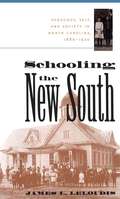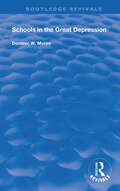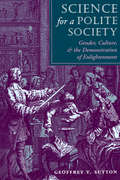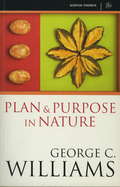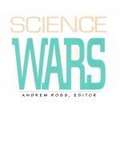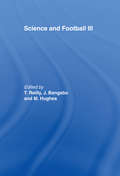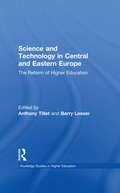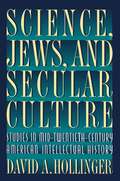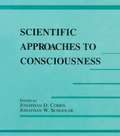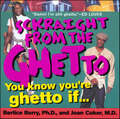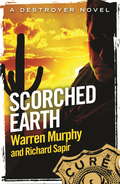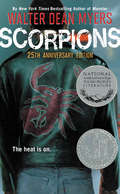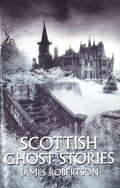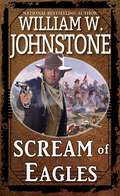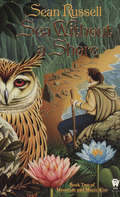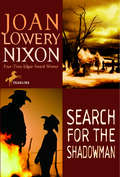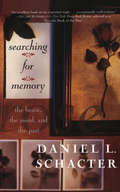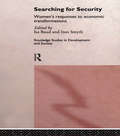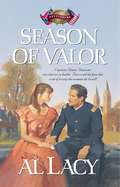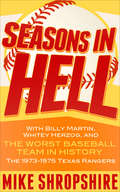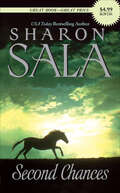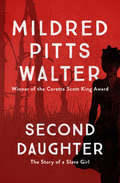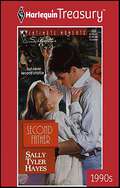- Table View
- List View
Schooling the New South
by James L. LeloudisSchooling the New South deftly combines social and political history, gender studies, and African American history into a story of educational reform. James Leloudis recreates North Carolina's classrooms as they existed at the turn of the century and explores the wide-ranging social and psychological implications of the transition from old-fashioned common schools to modern graded schools. He argues that this critical change in methods of instruction both reflected and guided the transformation of the American South. According to Leloudis, architects of the New South embraced the public school as an institution capable of remodeling their world according to the principles of free labor and market exchange. By altering habits of learning, they hoped to instill in students a vision of life that valued individual ambition and enterprise above the familiar relations of family, church, and community. Their efforts eventually created both a social and a pedagogical revolution, says Leloudis. Public schools became what they are today--the primary institution responsible for the socialization of children and therefore the principal battleground for society's conflicts over race, class, and gender. Southern History/Education/North Carolina
Schools In Great Depression
by Dominic W MoreoFirst Published in 1996. The Great Depression was not a seamless web of human experience. Disparate images of highs and lows in daily individual experiences proliferated. This study is a modest attempt to delineate the effects of the Great Depression upon the schools. For the most part, the “voices” of this work are drawn from the press and periodicals of the times. On one level, this work is concerned with the coming of the Depression and its effects upon the schools. It is a tale worth telling.
Science For A Polite Society: Gender, Culture, And The Demonstration Of Enlightenment
by Geoffrey V. SuttonTraditional accounts of the scientific revolution focus on such thinkers as Copernicus, Galileo, and Newton, and usually portray it as a process of steady, rational progress. There is another side to this story, and its protagonists are more likely to be women than men, dilettante aristocrats than highly educated natural philosophers. The setting is not the laboratory, but rather the literary salons of seventeenth- and eighteenth-century France, and the action takes place sometime between Europe's last great witch hunts and the emergence of the modern world.Science for a Polite Society is an intriguing reexamination of the social, cultural, and intellectual context of the origins of modern science. The elite of French society accepted science largely because of their personal involvement and fascination with the emerging philosophy of nature. Members of salon society, especially women, were avid readers of works of natural philosophy and active participants in experiments for the edification of their peers. Some of these women went on to champion the new science and played a significant role in securing its acceptance by polite society.As Geoffrey Sutton points out, the sheer entertainment value of startling displays of electricity and chemical explosions would have played an important role in persuading the skeptical. We can only imagine the effects of such drawing-room experiments on an audience that lived in a world illuminated by tallow candles. For many, leaping electrical arcs and window-rattling detonations must have been as convincing as Newton's mathematically elegant description of the motions of the planets.With the acceptance and triumph of the new science came a prestige that made it a model of what rationality should be. The Enlightenment adopted the methods of scientific thought as the model for human progress. To be an ?enlightened? thinker meant believing that the application of scientific methods could reform political and economic life, to the lasting benefit of humanity. We live with the ambiguous results of that legacy even today, although in our own century we are perhaps more impressed by the ability of science to frighten, rather than to awe and entertain.
Science Masters: Plan And Purpose In Nature (SCIENCE MASTERS)
by George C WilliamsGeorge C. Williams explains how evolution can produce remarkable adaptations in the natural world, and examines how the same process can also produce design flaws that can cause serious problems in living things - including in human beings.Plan and Purpose in Nature is a brilliant survey of Darwinian evolution in the natural world. It tells the story not only of the wonderful adaptations which the process of the natural selection produces throughout nature, but also the limitations of evolution for the 20th century human beings, which environment and diet have changed drastically while their biology and psychology have not.
Science Wars
by Andrew RossIn the wake of the highly fractious Culture Wars, conservatives in science have launched a backlash against feminist, multiculturalist, and social critics in science studies. Paul Gross and Norman Levitt's book Higher Superstition, presented as a wake-up call to scientists unaware of the dangers posed by the "science-bashers," set the shrill tone of this reaction and led to the appearance of a growing number of scare stories about an "antiscience" movement in the op-ed sections of newspapers across the country. Unwilling to be political scapegoats for the decline in the public funding of science and the erosion of the public authority of scientists, many of these critics--natural scientists, sociologists, anthropologists, historians, and scholars in cultural studies and literary studies--have taken the opportunity to respond to the backlash in Science Wars.At a time when scientific knowledge is systematically whisked out of the domain of education and converted into private capital, the essays in this volume are sharply critical of the conservative defense of a value-free science. They suggest that in a world steeped in nuclear, biogenic, and chemical overdevelopment, those who are skeptical of technology are more than entitled to ask for evidence of rationality in those versions of scientific progress that respond only to the managerial needs of state, corporate, and military elites. Whether uncovering the gender-laden assumptions built into the Western scientific method, redefining the scientific claim to objectivity, showing the relationship between science's empirical worldview and that of mercantile capitalism, or showing how the powerful language of science exercises its daily cultural authority in our society, the essays in Science Wars announce their own powerful message. Analyzing the antidemocratic tendencies within science and its institutions, they insist on a more accountable relationship between scientists and the communities and environments affected by their research.Revised and expanded from a recent issue of Social Text, Science Wars will provoke thought and controversy among scholars and general readers interested in science studies and current cultural politics.Contributors. Stanley Aronowitz, Sarah Franklin, Steve Fuller, Sandra Harding, Roger Hart, N. Katherine Hayles, Ruth Hubbard, Joel Kovel, Les Levidow, George Levine, Richard Levins, Richard C. Lewontin, Michael Lynch, Emily Martin, Dorothy Nelkin, Hilary Rose, Andrew Ross, Sharon Traweek, Langdon Winner
Science and Football III
by T. Reilly M. Hughes J. BangsboThe Third World Congress of Science and Football was held in Cardiff, Wales in April 1995. The aim of the conference was to continue to bridge the gap between the theory and practice of the various branches of football and increase the awareness of the value of a scientific approach to these games. These aims and the outcomes of the conference are reflected in this third volume of Science and Football.The volume is divided into eight parts, each part containing a group of papers that are related by theme or disciplinary approach. Metabolism and nutrition, football training, match analysis, medical aspects of football and psychology and football behaviour are just a few of the areas covered in this comprehensive, in-depth volume that has been fully edited and revised.The conclusions drawn during the congress represent an invaluable practical reference for coaches, scientists, players, managers, and all those involved in the many football codes.
Science and Technology in Central and Eastern Europe: The Reform of Higher Education (RoutledgeFalmer Studies in Higher Education #8)
by Anthony Tillet Barry LesserFirst Published in 1996. Routledge is an imprint of Taylor & Francis, an informa company.
Science, Jews, and Secular Culture: Studies in Mid-Twentieth-Century American Intellectual History
by David A. HollingerThis remarkable group of essays describes the "culture wars" that consolidated a new, secular ethos in mid-twentieth-century American academia and generated the fresh energies needed for a wide range of scientific and cultural enterprises. Focusing on the decades from the 1930s through the 1960s, David Hollinger discusses the scientists, social scientists, philosophers, and historians who fought the Christian biases that had kept Jews from fully participating in American intellectual life. Today social critics take for granted the comparatively open outlook developed by these men (and men they were, mostly), and charge that their cosmopolitanism was not sufficiently multicultural. Yet Hollinger shows that the liberal cosmopolitans of the mid-century generation defined themselves against the realities of their own time: McCarthyism, Nazi and Communist doctrines, a legacy of anti-Semitic quotas, and both Protestant and Catholic versions of the notion of a "Christian America." The victory of liberal cosmopolitans was so sweeping by the 1960s that it has become easy to forget the strength of the enemies they fought.Most books addressing the emergence of Jewish intellectuals celebrate an illustrious cohort of literary figures based in New York City. But the pieces collected here explore the long-postponed acceptance of Jewish immigrants in a variety of settings, especially the social science and humanities faculties of major universities scattered across the country. Hollinger acknowledges the limited, rather parochial sense of "mankind" that informed some mid-century thinking, but he also inspires in the reader an appreciation for the integrationist aspirations of a society truly striving toward equality. His cast of characters includes Vannevar Bush, James B. Conant, Richard Hofstadter, Robert K. Merton, Lionel Trilling, and J. Robert Oppenheimer.
Scientific Approaches to Consciousness (Carnegie Mellon Symposia on Cognition Series)
by Jonathan W. Schooler Jonathan D. CohenThere are many ways to approach the understanding of consciousness. Questions about these ways have occupied philosophers and metaphysicians for centuries. During the early growth of cognitive science the problem of consciousness remained taboo, but an increasing number of studies have either implicitly or explicitly begun to bear on its nature. These have been inspired by a number of different different original questions, and focus on a variety of different empirical phenomena. Thus, studies of implicit memory, subliminal processing, strategic versus automatic processing, allocation of attention, and differences between information processes in the awake versus dreaming state all share a common assumption of a particular quality or state -- awakeness, awareness, alertness, namely consciousness -- that somehow can be distinguished from another type of state or states in which the subject is not aware of the information being processed. What distinguishes the cognitive psychological and cognitive neuroscience approach to the question of consciousness from that of philosophy and metaphysics is scientific methodology: a set of tools that permit the empirical study of a phenomenon in an objective and reproducible way. Recent developments in both the empirical and theoretical methodologies of these fields have made it possible to begin to study the phenomenon associated with -- if not directly underlying -- consciousness in a scientific fashion. This volume tries to resolve the difficulties associated with the scientific investigation of consciousness. The intent is to explore the extent to which consciousness can be the target of direct scientific inquiry, to get on the table some of the relevant work, and consider the degree to which this research can help inform our understanding of consciousness. It brings together a group of cognitive and neuroscientists to share relevant recent research in the fields of cognitive science and neuroscience and to determine whether any new strategies for the scientific pursuit of this question can be developed. A long-term goal is the development of a unified understanding of consciousness, scientific as well as philosophical perspectives. This volume takes the first step toward building the necessary local bridges.
Sckraight From The Ghetto: You Know You're Ghetto If . . .
by Bertice Berry Joan CokerIs the only art you own on your fingernails? Do you consider kool-aid one of the five food groups?You know you're ghetto if:-Turning up the heat means turning on another burner on the stove-You think of paneling as a home improvement-You use a pair of pliers to change the channel on your TV-You run to get pots as soon as it rains-Your glasses and silverware come from a gas station-Your weave is longer than your torso-You have more than ten uses for Vaseline-and one of them is shoe polishGhetto is not where you live. Ghetto is not about income or social status. Ghetto is a state of mind.
Scorched Earth: Number 105 in Series (The Destroyer #105)
by Warren Murphy Richard SapirA single superheated zap from an invisible object in space literally vaporizes the Biobubble habitat scientists. More sizzling attacks are followed by eyewitness sightings of giant Cryllic letters in the sky.As the White House and Pentagon hastily cover up in reflective tinfoil to ward off the deadly rays, Remo and Chiun are dispatched to Russia to stop these stealth attacks before World War III really scorches the planet.But clandestine Russian forces are ready, lying in wait. They have their own red-hot agenda to find the culprit, even if it means going back to the wild and crazy Cold War days when the Party was really happening...Breathlessly action-packed and boasting a winning combination of thrills, humour and mysticism, the Destroyer is one of the bestselling series of all time.
Scorpions (A\trophy Bk.)
by Walter Dean MyersBad Trouble<P><P> Lately everybody's messing with Jamal. His teachers, the kids at school, even his dad. And now that Jamal's brother Randy's in the slam, Crazy Mack has a crazy idea. He wants Jamal to take control of the Scorpions and run crack. <P> All the gang jive--Jamal has no use for it. Unless, like some say, it's the only way to cop the bread for Randy's appeal...<P> The story of twelve-year-old Jamal, whose life changes drastically when he acquires a gun. Though he survives the experience, it's not without sacrificing his innocence and possibly his relationship with his best friend.<P> Newbery Honor book
Scott Paper Co.
by Jeremy Cott Stuart C. GilsonA professional turnaround manager attempts to implement a massive global downsizing program at the world's largest producer of consumer tissue products. The plan involves laying off almost one third of the company's 34,000 hourly and salaried employees and dramatically changing the company's business focus through massive asset sales-all in less than a year.
Scottish Ghost Stories
by James RobertsonWith its rich folklore and diverse cultural and religious heritage, Scotland has been a notoriously fertile haunting ground for the recording and transmission of ghost stories down the centuries, those of both well-documented lineage and accumulated legend.Inheriting the tradition of Hugh Miller, the nineteenth century folklorist and stonemason (whose own haunted life is the subject of the opening chapter), James Robertson has, where possible, researched the original or oldest written source and visited the site of each story to compile the most comprehensive and authoritative collection of the Scottish supernatural. Some of the stories gathered here are deservedly famous, such as those associated with Glamis Castle or the tale of Major Weir, while others ('The Deil of Littledean' and 'The Drummer of Cortachy') are less familiar or even contemporary accounts related to the author personally - but all are equally intriguing and fascinating reflections of the culture and period to which they belong.Neither a wary sceptic nor a fanatical believer, but an advocate of the validity of individual experience of the strange and unexplainable, James Robertson's Scottish Ghost Stories is an imaginative and chilling recasting of an established Scottish ghost-hunting and story-telling tradition - a homage to the particular mystery and character of a land which continues to produce ghosts whether from den to glen, Highlands to Lowlands, Catholic to Protestant.
Scottish Ghost Stories
by James RobertsonInheriting the tradition of Hugh Miller, the nineteenth century folklorist and stonemason (whose own haunted life is the subject of the opening chapter), James Robertson has, where possible, researched the original or oldest written source and visited the site of each story to compile the most comprehensive and authoritative collection of the Scottish supernatural. Some of the stories gathered here are deservedly famous, such as those associated with Glamis Castle or the tale of Major Weir, while others ('The Deil of Littledean' and 'The Drummer of Cortachy') are less familiar or even contemporary accounts related to the author personally - but all are equally intriguing and fascinating reflections of the culture and period to which they belong.Neither a wary sceptic nor a fanatical believer, but an advocate of the validity of individual experience of the strange and unexplainable, James Robertson's Scottish Ghost Stories is an imaginative and chilling recasting of an established Scottish ghost-hunting and story-telling tradition - a homage to the particular mystery and character of a land which continues to produce ghosts whether from den to glen, Highlands to Lowlands, Catholic to Protestant.
Scream of Eagles (Eagles #4)
by William W. JohnstoneRaised by the Shawnee, Jamie Ian MacCallister survived the bloodshed of the Alamo and the Civil War. With each victory, the MacCallister legend grew–as violent and unpredictable as the land that gave him life… From the greatest western writers of the 21st century, the classic fourth adventure in The Eagles, one of the most iconic and beloved sagas of the American frontier, is back in print as legendary Scottish frontiersman Jamie MacCallister blazes through the Wild West. Now the battle has gotten personal: the brutal murder of his wife at the hands of the wild Miles Nelson gang. Jamie&’s journey of revenge will take him from Atlantic City&’s bustling port of thieves, con men and whores to the pristine and deadly landscape of the Colorado Rockies…and finally to a place called Little Big Horn. All he has at his side are his sons and an unquenchable thirst for justice–MacCallister style.
Sea Without a Shore (Moontide Magic Rise #2)
by Sean RussellThe second book chronicling the epic fantasy adventures of naturalist Tristram Flattery as he voyages to discover the lost history of magic in a world where reason and science reignThe secrets of the Mages had been lost with the passing of Erasmus Flattery, a man of Talent who had served the last known Mage. It seemed to be the dawn of a new era—a time of reason, science, and exploration. And Tristam Flattery, Erasmus&’ nephew, was one of its most promising young naturalists. Sent by the palace on a voyage halfway around the world, Tristam finds himself led by a mysterious white bird—which may be the ghost of his uncle&’s familiar—to a remote island in the middle of a vast ocean, where the natives have clearly been awaiting his coming. And it soon becomes all too obvious to Tristam that his course was set by no living man. Lost in a land of legend, surrounded by a world which defies his rational beliefs, Tristam comes to realize that he has inherited more than he thought from his illustrious uncle. Now the fate of his world lies on his shoulders—for it will be up to him to decide whether to open a dangerous door which has long been closed, or keep that magical gateway forever locked.
Search for the Shadowman
by Joan Lowery NixonTwelve-year-old Andy Bonner isn't thrilled with his teacher's assignment to explore family history. When he starts asking questions about his ancestors, he is startled to discover a black sheep in the family tree. No one wants to reveal what happened in his family's past. But Andy is determined to break the silence. Casting his net widely, from the Internet to the local cemetery, Andy's search helps everyone realize it's never too late to seek justice.
Searching for Memory: The Brain, the Mind, and the Past
by Daniel L. SchacterMemory. There may be nothing more important to human beings than our ability to enshrine experience and recall it. While philosophers and poets have elevated memory to an almost mystical level, psychologists have struggled to demystify it. Now, according to Daniel Schacter, one of the most distinguished memory researchers, the mysteries of memory are finally yielding to dramatic, even revolutionary, scientific breakthroughs. Schacter explains how and why it may change our understanding of everything from false memory to Alzheimer’s disease, from recovered memory to amnesia with fascinating firsthand accounts of patients with striking--and sometimes bizarre--amnesias resulting from brain injury or psychological trauma.
Searching for Security: Women's Responses to Economic Transformations (Routledge Studies in Development and Society #1)
by Isa Baud Ines SmythHuman Security is a development buzzword of the 1990s. To attain security people need to be safe from natural disasters, such as famine, and 'man-made' problems, such as unemployment. Women are a particularly insecure section of society with the impact of deprivation disproportionately shouldered by women throughout the developing world. Searching for Security examines how economic, political and environmental factors have contributed to increased gender insecurity in the last decade. Analyzing the impacts of insecurity-inducing global changes on the lives of women throughout the developing world, the book discusses the gender responses to these changing circumstances from Africa to Malaysia, Hungary to the Caribbean. By examining the impact of liberal economic policies, and to a lesser extent the impact of war, rape and environmental damage on the lives of women, this collection of essays makes a timely contribution to emerging policy efforts to recognize and address the issue of gender insecurity.
Season of Valor (Battles of Destiny Series #6)
by Al LacyWriting against the dramatic backdrop of beautiful Brunswick, Maine, and following the story's main characters into the Battle of Gettysburg-a critical turning point in the Civil War-author Al Lacy spins a tale of courage and lost love as heroic Captain Shane Donovan mourns the failing health of the wife he cherishes and is ultimately reunited with the love of his youth in the bittersweet Season of Valor.From the Trade Paperback edition.
Seasons in Hell: With Billy Martin, Whitey Herzog and, "the Worst Baseball Team in History"—The 1973–1975 Texas Rangers
by Mike Shropshire&“A funny, revealing, Ball Four–like romp through mid-seventies baseball&” from the longtime sports columnist and author of The Last Real Season (Booklist). You think your team is bad? In this &“disastrously hilarious&” work on one of the most tortured franchises in baseball, one reporter discovers that nine innings can feel like an eternity (USA Today). In early 1973, gonzo sportswriter Mike Shropshire agreed to cover the Texas Rangers for the Fort Worth Star-Telegram, not realizing that the Rangers were arguably the worst team in baseball history. Seasons in Hell is a riotous, candid, irreverent behind-the-scenes account in the tradition of The Bronx Zoo and Ball Four, following the Texas Rangers from Whitey Herzog&’s reign in 1973 through Billy Martin&’s tumultuous tenure. Offering wonderful perspectives on dozens of unique (and likely never-to-be-seen-again) baseball personalities, Seasons in Hell recounts some of the most extreme characters ever to play the game and brings to life the no-holds-barred culture of major league baseball in the mid-seventies. &“The single funniest sports book I have ever read.&”—Don Imus &“The locker-room shenanigans of a lousy team of the 1970s.&”—Publishers Weekly
Second Chances
by Sharon SalaA chance encounter reunites a woman with the cowboy who stole her heart in the USA Today–bestselling author’s tender contemporary Western romance.It was the kind of encounter Billie had seen only in the movies, and never dreamed could happen to her. A rugged, sexy cowboy appeared from out of nowhere to stir her passions—and then, just as quickly, he was gone. For one brief moment in time the walls Billie had built around her heart tumbled. When it was over, she was sure their fiery passion would live on only as a bittersweet memory.Then fate leads Billie to a sprawling Texas ranch, and there he is again—Matt, her handsome, mysterious stranger, the best thing that had ever happened to her. Knowing that the pain of losing him a second time would be too much, her instinct is to run fast and far away. But Matt let Billie go once and he's not going to make the same mistake again—because nothing on Earth will stop him from grabbing a second chance at love.
Second Daughter: The Story of a Slave Girl
by Mildred Pitts WalterSet during the American Revolution and based on a true story, Elizabeth Freeman, a young slave, sues for her freedom--and wins Sheffield, Massachusetts. Six-year-old Aissa and her older sister, Elizabeth, work as slaves in the home of their owners--Master and Mistress Anna. Raised by Elizabeth after their mother died, and chafing under the yoke of bondage, Aissa is a natural-born rebel. Elizabeth, nicknamed Bett by her owners, is more accepting of her fate in spite of growing anti-slavery sentiment. She marries Josiah Freeman, a freed black man, and they have a child. Then on July 4, 1776, America achieves her dream of independence from England, and in 1780, Massachusetts drafts its own constitution, establishing a bill of rights. When Mistress Anna, angered by Aissa's defiance, threatens her with a hot coal shovel, Bett takes the blow instead, and is severely burned. She walks out of the house, vowing never to come back--and takes her owners to court. Second Daughter is both riveting historical fiction and rousing courtroom drama about slavery, justice, courage, and the unconquerable love between two sisters.
Second Father
by Sally Tyler Hayes...but never second choiceANOTHER MAN'S WIFEPolice Detective Marc Dalton had always secretly loved his best friend's wife. Now Ginny was his best friend's widow and trying to raise her baby alone amidst troubling allegations surrounding her husband's death. Knowing he could no longer stand by in silence, Marc decided to offer Ginny his help...and his heart.Ginny had always seen Marc as a friend-a wonderful man who should already have settled down with a wife and children. But now Marc was confessing he'd always been crazy about her, that he wanted to be a second father to her little girl. How could Ginny resist such a tempting offer? How could she betray her memories and succumb to another man's embrace?
